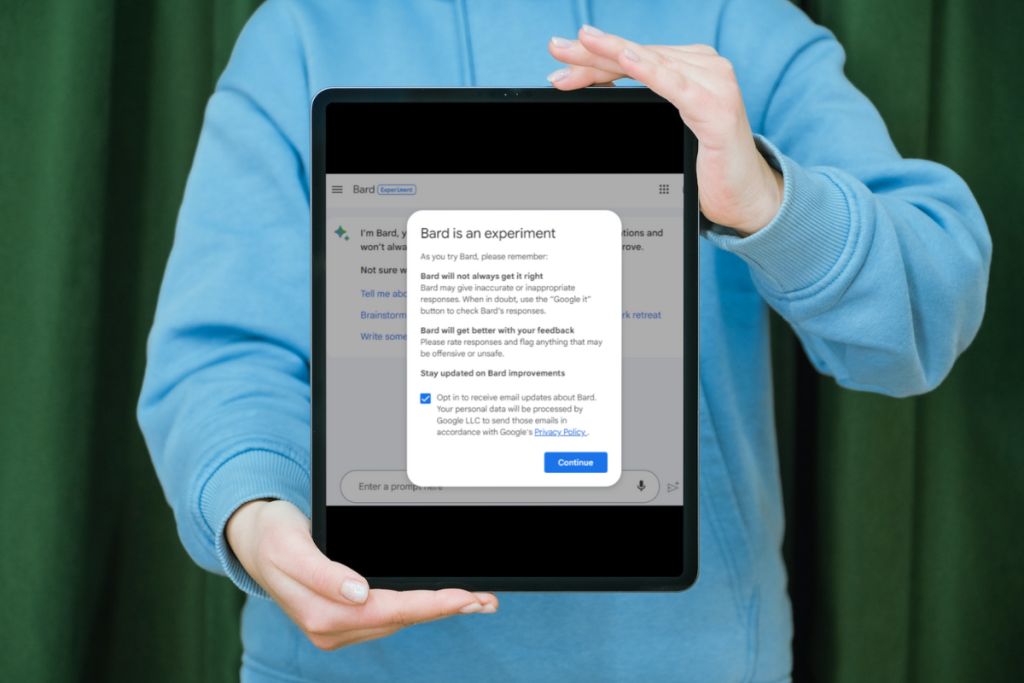
-
Apexlink
Real Estate
-
DLS
General Insurance
-
DMV
Government
-
Entiger
Fintech
-
GIS Mapping
Gas & Petroleum
-
HMS
Employee Benefit
-
HAWA
Government
-
Harley
Community
-
IHG
Hotel & Tourism
-
Sparkseeker
Humane Tech
-
Track Ninja
Sports
-
Response Vision
Disaster Management
- Artificial Intelligence
- Application Services
- Automation Services
- Cyber Security
- Chatbot Experts
- Data Analysis
- Data Warehouse Services
- Machine Learning
- Digital Commerce Services
- Digital Transformation
- Infrastructure Service
- IT Support
- IT Consulting
- IT Outsourcing
- IOS Development
- Android Development
-
Cross Platform Development
-
Gaming App Development
Technology is evolving at such a fast pace that we are witnessing several innovations each day. Given the fact that ChatGPT was the first of its kind AI application, it certainly made some waves and was under the limelight for a fairly long time until Google announced a rival – Bard, and once again, all eyes are on spotting the winner in the ChatGPT vs Bard war. Even though it's been a while since they made the announcement, the buzz has resurfaced since they announced their public release.
If you missed out on the Bard release date, start using it right away on bard.google.com.
ChatGPT vs Bard: First Things First
While OpenAI is now pretty confident in ChatGPT and its abilities, Google has clearly stated that their brainchild, Bard, is an experiment.

And here is what ChatGPT says about its free research preview.

As you must have noticed from the first glimpses, ChatGPT & Google Bard are both conversational AI models. These large language models are trained on humungous datasets of text and code. Both these models can generate text, translate several languages, write and assist with different kinds of creative content, and answer your questions in an informative and conversational way.
ChatGPT vs Google Bard: Points of Difference
It’s true there are hundreds of similarities between the Google AI chatbot and ChatGPT, but there are several points of difference as well. Earlier, Bard claimed to have an edge over ChatGPT because of its ability to access the internet but with ChatGPT rolling out its latest updates, that is no longer a USP. Let's try to take a closer look at the differences.
Data
One of the biggest differences between Bard and ChatGPT is the data they were trained on. Bard is trained on a massive dataset of text and code that includes information from the internet, while ChatGPT is trained on a dataset of text that was collected up to 2021. This means that Bard has access to the latest information and research, while ChatGPT may be more limited in its knowledge.
Language Model
Bard and ChatGPT use two different language models. Google uses LaMDA, a model trained on dialogue. LaMDA and PaLM 2 are built on a neural network architecture called Transformer that can be trained to read many words, pay attention to how those words relate to one another and then predict what words it thinks will come next.
ChatGPT, on the other hand, uses GPT-4 – a large multimodal model that exhibits human-level performance on various professional and academic benchmarks. GPT-4 outperforms its predecessor GPT-3.5.
Integrations
Google Bard has a significant advantage due to its seamless integration with Gmail and Google Workspace tools. With this, you can easily transfer chats to Gmail and Google Docs.
Pricing
Google Bard is currently free to use, however, the plus model of ChatGPT costs around $20 per month. It will be interesting to note how this changes over the next few months as Bard expands its offerings.
To answer if we have a clear winner in the ChatGPT vs Google Bard battle would be a lie primarily because the few but significant differences between the two make one a better choice than the other for specific tasks. For example, if it is a task that could use access to the latest information, Bard would be your best bet, and if you are looking for an assistant who could code something for you, ChatGPT has proven to be highly reliable.
ChatGPT vs Google Bard: Winner in Specific Use Cases
General Questions: As far as answering generic questions, such as helping plan a trip to Australia from India, is concerned, both the models perform surprisingly well, and it would be unfair to pick one over another.
Making Recommendations: While you would expect Google’s Bard to produce a customized answer, ChatGPT emerges out to be a clear winner by producing more personalized and informative content. The best part is that it also asks you questions to help you fine tune its answer for you.
Sensitive Matters: When it comes to sensitive questions such as seeking help for suicide prevention or wearing masks to a party, both the models offered similar responses, calling for a tie. No winner in ChatGPT vs Google dilemma here.
Short-term Memory: ChatGPT is a clear winner in this case as it is much better at remembering the conversation and makes asking follow-up questions a breeze. With its limited retaining capacity at the moment, Bard could certainly use some more improvements.
Coding Related Tasks: When you use ChatGPT and Bard for code generation, you will be surprised by how reliable these two are. However, ChatGPT takes the trophy home in this scenario for producing more sophisticated code snippets than its rival model.
Current Data: It goes without saying that Google is the king in the domain of search engines, and Bard’s internet accessing capabilities put it at the head of the list for researching current data and figures.
Creative Flair: If you ask ChatGPT and Bard to write a poem for your beloved, you’d be surprised by how good the former is. The choice of words, verse structure, and even the use of poetic devices is bewilderingly good.
Wrapping It Up
It is truly impressive how far both these large language models have come over a very short span of time. But is Google Bard better than ChatGPT still continues to be a tough one to answer given that each model performs better than the other under specific circumstances and different scenarios.
As the Google vs ChatGPT rivalry continues at this pace, it will be interesting to watch out for all the advancements artificial intelligence makes over the next few years and even months! Which of the two are you betting on?
FAQs
Is Bard powered by ChatGPT?
No, Bard is built on a LaMDA and PaLM 2 while ChatGPT is a different large language model altogether that is built on the top of GPT-3.5 and GPT-4.







 Artificial Intelligence
Artificial Intelligence
 Blockchain
Blockchain Cloud Computing
Cloud Computing Infrastructure
Services
Infrastructure
Services Metaverse
Metaverse QA
Automation
QA
Automation UI/UX
UI/UX








